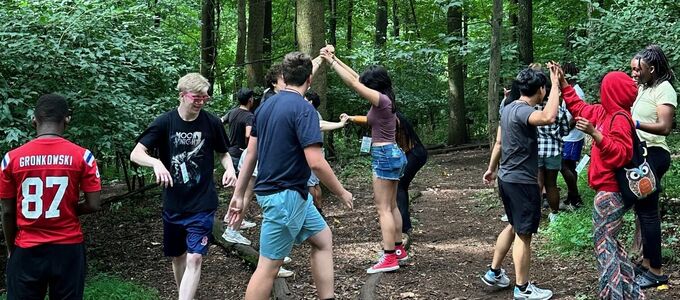
They live far away from one another and rarely come together. It is not always easy for New Apostolic young people in the USA to find their place in the congregation. The Church leadership has therefore had to think of a way to support them in their spiritual development.
Often the new Deacon or the next youth leader has already been there for a long time. He or she has simply not been discovered yet. Discovering and using spiritual talents—this is the purpose of an online program all about “Spiritual Gifts”, which was developed by the Regional Church of the USA. A system was designed to help young people develop their spiritual gifts using an online course. Facilitators at the congregational level help them to implement their ideas and support communication between the young people.
Finding a place in the congregation
“We believe that young adults should strive to find their place in the congregation. For example, we encourage them to get involved as mentors for younger youth,” says Kimberly Kolb-Heinzelmann, who also works as the Project Manager responsible for public relations in the Regional Church of the USA. Participation in these courses is intended to give the young Christians new joy, enthusiasm, and an awareness of their talents. Beyond that, they are to come up with ideas about how they can engage these gifts in the congregation.
Unearthing treasures
The Spiritual Gifts program was introduced in the year 2011 and is intended especially for young people and young adults. The objective is to help them engage their own unique abilities in their congregations. Kimberly Kolb is convinced that both the young Christians and the congregations profit as a result. “We encourage them to become actively involved in small peer groups or even intergenerational groups. One of the first exercise units we offer our young adults is called Discovering Your Spiritual Gifts,” explains Kimberly Kolb. The unit brings small groups together to work on various topics over a series of sessions led by a moderator. Videos and a workbook are also available to support the group. The curriculum takes the participants on a journey of discovery to help them identify their spiritual gifts and the topics and those areas of work that are of specific interest to them. Participants are given the opportunity to discuss with one another how they see their congregations, and reflect on how they can help them to develop further. The guiding principle is the parable of the talents from Matthew 25: 14-30. After 12 years, Kimberly Kolb has come to a positive conclusion: “The program works.”
Finding one’s place
One young person who has participated in the program is Peter Wagner. The 20-year-old belongs to the congregation of Erie, which is located near Lake Erie in the north of the USA, not far from the Canadian border. He was fifteen years old when he heard about the Spiritual Gifts program for the first time in his congregation. However, he only started to think about it seriously when he learned about the THRIVE program during a youth discussion. The letters in the acronym THRIVE stand for:
- Transform your nature using Jesus Christ as your example
- Help Spread the Gospel
- Respond to the call to serve
- Invest in your Spiritual Health
- Value the Church
- Embrace the promise of Christs Return
Learning and understanding
“The THRIVE program is intended for young people who attend grades 8 to 12,” says Peter. Older youth can then continue with the Spiritual Gifts program. “I participated because I wanted to find out what spiritual gifts I have and how I can use them in my life. I also want to continually deepen my relationship with God. I learned a lot about myself through the program, namely who I am and what characteristics define me.” Peter is convinced of the program’s benefits: “Yes, it is nice to learn by listening to the sermons, but by exchanging ideas and convictions with other people I can learn even better and understand more. Talking to others about my faith has helped it to grow.”
The group meets every Wednesday for an hour. “Usually we begin with a prayer and then discuss a topic,” says Peter. “After that we do a practical exercise that has to do with that topic. The evening also concludes with a prayer.” There have been a variety of different prayers in the group, including prayers while walking outside and group prayers.
Fellowship helps
“By participating in group work, I have learned to build a personal relationship with God. We also discussed real problems with one another and collected ideas on how to address them in line with Holy Scripture. The program has also helped me to better understand what exactly makes up the church.” Peter only finds it a shame that the time spent on each topic is limited to one hour. Often he would like to take more time for such discussions.
The Church leadership in the USA is doing a lot to ensure that young New Apostolic Christians can come into contact with each other, and not just online. “Every few years we hold a national youth conference to which we invite professional speakers,” relates Kimberly Kolb. Evangelist Reinhard Kiefer, who advises the Church leadership on theology, has attended on several occasions. At these meetings, the young people also come into contact with their District Apostle and have the opportunity to discuss topics that are important to them.
Strengthened in their faith and enriched by the many new contacts they have made, the young people drive back to their far-flung congregations on Sunday afternoon. They know that they do not have to walk the path of faith alone, however.












